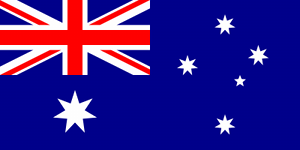 Our CC jurisdiction teams are always hard at work on critical license maintenance and version upgrades. Currently, many of these talented local teams are adapting Version 3.0, released February 2007, to the laws and languages of more than 70 jurisdictions around the globe. Joining the jurisdictions that offer licenses at 3.0 is Creative Commons Australia, whose versioning process revealed important insights into the licenses and suggestions for future versions.
Our CC jurisdiction teams are always hard at work on critical license maintenance and version upgrades. Currently, many of these talented local teams are adapting Version 3.0, released February 2007, to the laws and languages of more than 70 jurisdictions around the globe. Joining the jurisdictions that offer licenses at 3.0 is Creative Commons Australia, whose versioning process revealed important insights into the licenses and suggestions for future versions.
The Australian licenses already have their first significant adopter, the Australian Parliament. The Parliament’s central web portal http://www.aph.gov.au houses the most important documents of the Australian Federal Government including all bills, committee reports and, most importantly, the Hansard transcript of Parliamentary Sittings, and the portal will be published under a Creative Commons BY-NC-ND Version 3.0 Australian license.
Thanks so much to the CC Australia team, headed by Professor Brian Fitzgerald and Tom Cochrane and coordinated by Jessica Coates and Elliott Bledsoe at Queensland University of Technology, for their diligence and input. Congratulations!
From CC Australia:
The Australian v3.0 licences…have been developed over the last few years via a public consultation process. We thank all of those who provided feedback on the licences, particularly our colleagues at CC Aoteoroa New Zealand and within the Australian government and non-profit sectors.
Our main aims during the Australian v3.0 drafting process were to ensure that the new licences:
- complied with Australian legal requirements and conventions;
- aligned with the rights and restrictions of the Unported (ie non-country specific) licences provided by Creative Commons; and
- were clear and easy for creators and users alike to read and understand.
Based on these aims, we made the following changes to the licences:
- adapting the Unported formatting and language to bring them more in line with Australian law and drafting conventions – mainly by using localised definitions and introducing lists and headings;
- simplifying some of the language, where this would not affect the legal interpretation of the licence – many of these simplifications were adopted from the recent version put together by our friends in New Zealand;
- a few minor additions to clarify the operation of the licences in the Australian context, in response to feedback from our consultation process – these included clarifying how the licences operate with respect to sublicensing and adding language to ensure that the licences comply with the requirements of Australian consumer protection law.
We are happy to release these licences, which we believe provide clear, reasonable and legally sound options for creators and users alike and represent a new best practice standard for the CC licences in Australia. If you would like any more information about the licences please feel free to contact us at info@creativecommons.org.au. For more information on the versioning process contact the Creative Commons head office.






